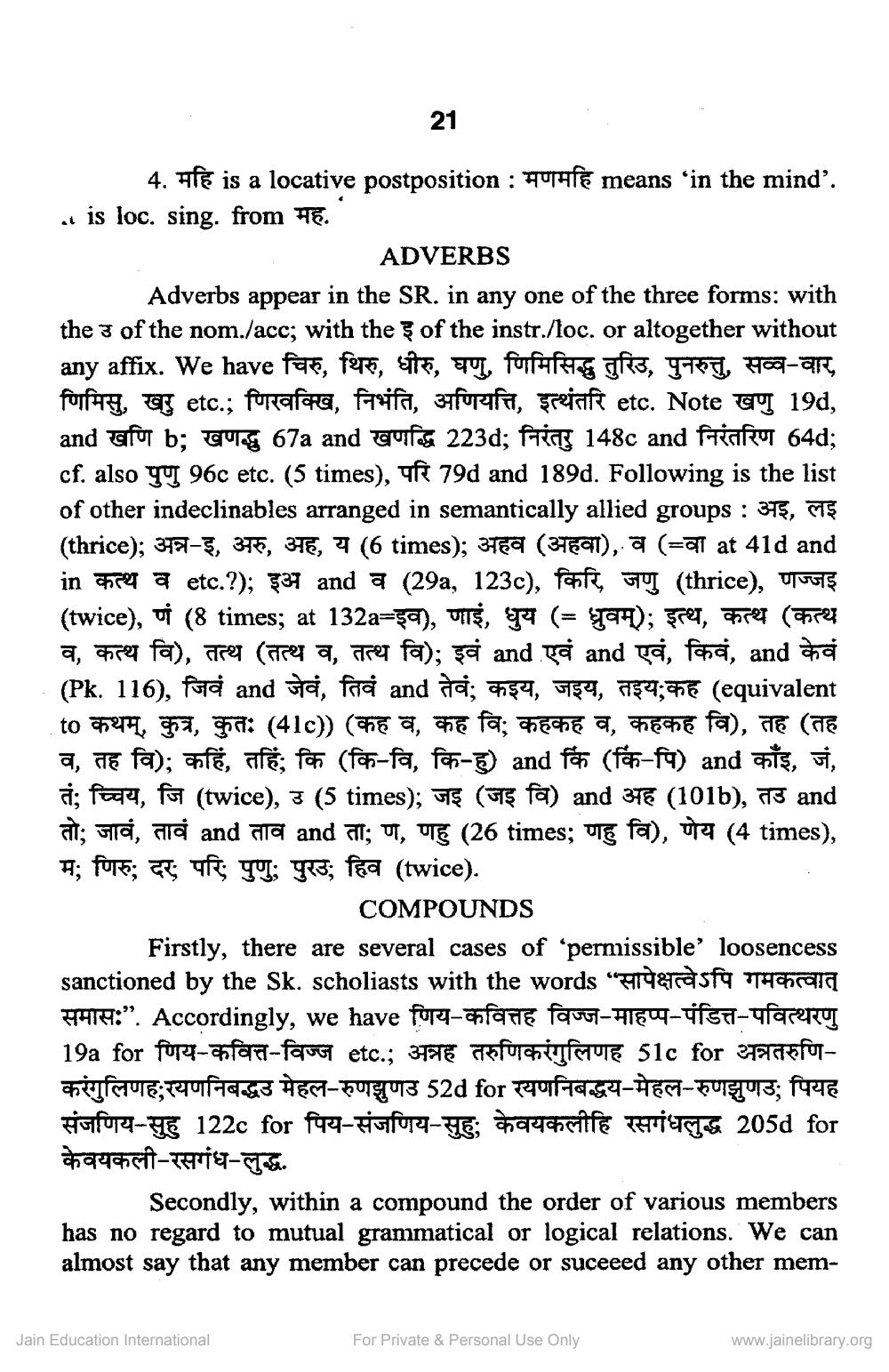________________
21
4. महि is a locative postposition : मणमहि means in the mind'. .. is loc. sing. from मह.
ADVERBS Adverbs appear in the SR. in any one of the three forms: with the 3 of the nom./acc; with the s of the instr./loc. or altogether without any affix. We have चिरु, थिरु, धीरु, घणु, णिमिसिद्ध तुरिउ, पुनरुत्तु, सव्व-वार, णिमिसु, खरु etc.; णिरवक्खि , निभंति, अणियत्ति, इत्थंतरि etc. Note खणु 19d, and खणि b; खणद्ध 67a and खणद्धि 223d; निरंतुरु 148c and निरंतरिण 64d; cf. also पुणु 96c etc. (5 times), परि 79d and 189d. Following is the list of other indeclinables arranged in semantically allied groups : अइ, लइ (thrice); अन्न-इ, अरु, अह, य (6 times); अहव (अहवा), व (=वा at 41d and in कत्थ व etc.?); इअ and व (29a, 123c), किरि, जणु (thrice), णज्जइ (twice), णं (8 times; at 132a-इव), णाई, धुय (= ध्रुवम्); इत्थ, कत्थ (कत्थ व, कत्थ वि), तत्थ (तत्थ व, तत्थ वि); इवं and एवं and एवं, किवं, and केवं (Pk. 116), जिवं and जेवं, तिवं and तेवं; कइय, जइय, तइय;कह (equivalent to कथम्, कुत्र, कुतः (41c)) (कह व, कह वि; कहकह व, कहकह वि), तह (तह व, तह वि); कहि, तहिं; कि (कि-वि, कि-हु) and किं (किं-पि) and काँइ, जं, तं; च्चिय, जि (twice), उ (5 times); जइ (जइ वि) and अह (101b), तउ and तो; जावं, तावं and ताव and ता; ण, णहु (26 times; णहु वि), णेय (4 times), म; णिरु; दर; परि; पुणु; पुरउ; हिव (twice).
COMPOUNDS Firstly, there are several cases of 'permissible' loosencess sanctioned by the Sk. scholiasts with the words “सापेक्षत्वेऽपि गमकत्वात् समासः". Accordingly, we have णिय-कवित्तह विज्ज-माहप्प-पंडित्त-पवित्थरणु 19a for णिय-कवित्त-विज्ज etc.; अनह तरुणिकरंगुलिणह 51c for अन्नतरुणिकरंगुलिणहारयणनिबद्धउ मेहल-रुणझुणउ 52d for रयणनिबद्धय-मेहल-रुणझुणउ; पियह संजणिय-सुह 122c for पिय-संजणिय-सुह; केवयकलीहि रसगंधलुद्ध 205d for केवयकली-रसगंध-लुद्ध.
Secondly, within a compound the order of various members has no regard to mutual grammatical or logical relations. We can almost say that any member can precede or suceeed any other mem
Jain Education International
For Private & Personal Use Only
www.jainelibrary.org




